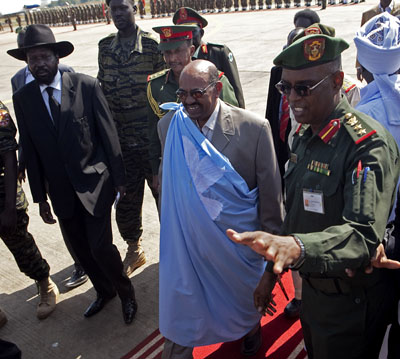
This piece originally appeared on Global Post.
JUBA, South Sudan — “We will completely break relations with Sudan,” said Pagan Amum, South Sudan’s lead negotiator. “It is in our long-term interest to not cooperate with Khartoum.”
It was three days into the last round of talks between Sudan and South Sudan in Addis Ababa in late January. Amum had just emerged from a meeting in which he threatened to cut the flow of oil from the South to the North, the economic lifeblood for both countries. Days later, the shutdown began.
For the last year and a half, Sudan and South Sudan have been negotiating the arrangements of their separation, which occurred on July 9, 2011, including the amount of money the South should pay to pump its oil through pipelines in the North.
The negotiations have rested on the key assumption that both sides would work toward the viability of the other state, the conventional wisdom being that building on the existing economic linkages between the former civil war foes would encourage Juba and Khartoum to remain at peace with one another following southern independence. The two pipelines that connect oilfields in the South to a port and refineries in the North are the most visible manifestations of the ties that continue to bind the two countries. Cultural and historical connections between the two populations and a common 1,305-mile border were also reasons to believe that creating dependency between the two states would be the best means for establishing peaceful relations.
Juba’s decision to cut oil flow to the North has upset this dynamic.
“We reject the assumption that mutual dependency of our two nations is the path to peace. It is not,” said South Sudan President Salva Kiir in a recent statement to the press. In a game-changing move, the government of South Sudan upturned the foundation on which the international community has based its approach to South Sudan-Sudan relations.
The immediate cause for the South’s oil stoppage was Khartoum’s decision to confiscate what the South estimates to be $815 million worth of southern oil during negotiations. In response, Juba decided the only means of protecting its most valuable national asset was to keep it in the ground.
More importantly, the decision speaks to the deep-seated distrust that Juba has for Khartoum, and the view that the North has been, and will always be, an unreliable partner in the negotiation and implementation of peace agreements. Juba asks, exasperated and bitter after years of what it sees as subjugation to Khartoum’s aggressions and whims: “They have never engaged with us in good faith, why should we be expected to continue to deal with them now that we have the freedom to decide not to do so?”
But Juba’s decision is not purely defensive. The South calculates that an oil shutdown will ultimately hurt Sudan’s economy more than South Sudan’s, thus returning the advantage to Juba’s side in the North-South feud. However, Juba, too, stands to lose tremendously in the short-term. One of the world’s least developed nations, South Sudan has now shut off the source of 98 percent of its annual budget.
The distrust and emotional baggage from decades of war go both ways.
Continue reading on Global Post.
Photo: Sudanese President Bashir in South Sudan prior to independence (AP)

